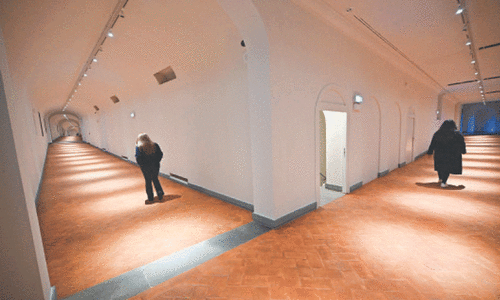VIENNA: European governments expressed relief on Monday that Serbia’s pro-Western president survived a tough re-election challenge by an ultranationalist rival, and pledged anew to help bring the Balkan country into mainstream Europe.
Germany said it saw Boris Tadic’s slim victory on Sunday over Serbian Radical Party challenger Tomislav Nikolic as proof that Serbs see their future in Europe.
“Serbia faces great challenges at the moment. These call for prudence and far-sightedness on the part of the political leadership,” said German Foreign Minister Frank-Walter Steinmeier.
“I am convinced that the vision of a stable, democratic and European Serbia which President Tadic represents has a future,” Steinmeier added.
In a message to Tadic, European Commission President Jose Manuel Barroso called it “a victory for democracy in Serbia and for the European values we share.”
“Your victory comes at a critical moment for Serbia and for the western Balkans. I am confident that Serbia will continue to play a constructive role in facing up to current challenges and in ensuring stability in the region,” said Barroso, who heads the European Union’s executive commission.
Voters’ decision to veer away from the pro-Russia Nikolic — whose election would have risked plunging Serbia into renewed unrest and isolation — “will fundamentally contribute to the stability of the entire region of southeast Europe,” said Czech Prime Minister Mirek Topolanek.
Both Germany and neighbouring Austria promised more support to help Serbia move toward eventual membership in the European Union.
“Serbia’s place remains in a new and common Europe,” said Ursula Plassnik, Austria’s foreign minister. “We want to put Europe within Serbia’s grasp.”
But Plassnik — noting that the election left Serbia bitterly divided — called on Tadic “to be president of all Serbs and include everyone in the process of European integration.”
EU foreign policy chief Javier Solana said the results “signal that the majority of the people of Serbia want to continue the path toward Europe.”
Last week, EU nations agreed to move toward closer ties with Serbia in an effort to counter rising anti-Western anger over Kosovo’s expected decision to declare independence later this month.
Many Serbs see the breakaway southern province as their ancient homeland. Although both Tadic and Nikolic fiercely oppose statehood for Kosovo, Nikolic had garnered support from Serbs who see Tadic as softer on the issue.
In Kosovo, President Fatmir Sejdiu said on Monday the vote showed Serbia’s will to break with its violent past and move closer to Europe.
“It indicates that it’s time for Serbia to leave the past behind, especially their radical views over Kosovo ... and look towards euro-Atlantic integration,” Sejdiu said.
Parliament speaker Jakup Krasniqi also hailed Tadic’s re-election as “a victory for more democratic forces in Serbia,” but said it would have no bearing on plans by the province’s ethnic Albanian majority to declare statehood.
“Kosovo’s parliament is ready ... to declare independence within this month. We are certain of it,” Krasniqi said.
The EU and Serbia are to sign their political cooperation deal on Thursday.
The pact aims to establish regular political ties, open up trade, and end visa restrictions on Serbs. It falls short of a wider deal to prepare Serbia for EU membership — a move the Netherlands blocked because of Serbia’s failure to hand over indicted war crimes suspects.
The Kremlin did not immediately react, but a leading lawmaker played down Nikolic’s pro-Russia stance and characterised Tadic as a “constructive partner.”
“Russian-Serbian relations will continue to be on the rise,” said Konstantin Kosachyov, who heads the international affairs committee in Russia’s lower house of parliament. Russia signed a major energy deal with Serbia last month.—AP












































Dear visitor, the comments section is undergoing an overhaul and will return soon.